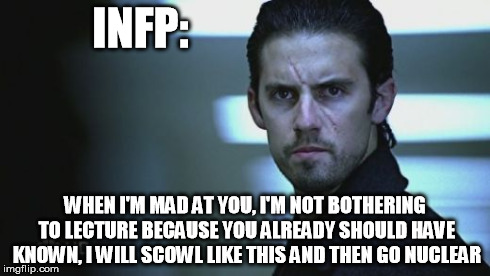I think this is very wise what you are saying - granted. But what do you do when you have only a few seconds to react to one of your boundaries being crossed? The process you're describing above seems time-consuming - or it would be to me - especially strategizing response. With people and feelings involved I would have an impression that there were too many factors that I needed to take into account. If you found a good way to do it quickly (or if anyone did) could you please share it - that would be great

.
That's true. I gladly cheat with the combination of a prescription stimulating anti-depressant and advancing adulthood (mid-30s now). The combination gives me much greater
instinctive control over my emotions than I had at 28, with my anxiety undiagnosed (and therefore untreated) and just plain less practice than I have now. I'm finally more like what a mature, healthy INFP
should be like: able to simultaneously feel intensely and communicate with empathy without having to consciously think about it, like a pro athlete of the heart. In some ways, I actually look forward to getting older, since my body is young for its years, and I could really use more wisdom.
As to exploding - I am not really against it. In civilized forms it can be very useful. There are a few people out there who won't take no for an answer - after a few attempts to be polite a mild and controlled explosion can do the trick.
One more thing, there is another side to the issue. We (I mean people) tend to categorize others very quickly and later we don't like to change our minds about them. Once xNFP is classified by their friends as spontaneous and easy-going it's very hard to believe that xNFP would not agree to something or would mind something. So it's not only that that we let our anger out too late, but we have a thicker wall around us. Some people tend not to believe that we are serious in our protests unless we state them firmly, sometimes too firmly. Or at least this is my experience.

I used to think that way. Over the years, my perspective has shifted. Dr. Phil is right that the only person who can change you is you. As a corollary, the only person who can change them is them. I found that the
appearance of effectiveness of flagrant displays of anger did not hold up over time unless emotional trauma was caused, which is wrong.
For the former, physical retreat is primo. People who won't take no for an answer can be very scary, since they're typically only that persistent for your money or your sex. If you're stalking away and they're stalking you, just remind them that it's a crime to try and stop someone from calling 911, and then pull out your cellphone. Also, harassment is a crime that is ambiguous from an external perspective... unless you're trying to retreat from the situation and they're refusing to let you, which makes it obvious.
For the latter, again, physical retreat is primo. Maybe I'm just a pathetic stereotype in my reliance on retreat, I don't know. I make every effort to communicate my own feelings without wrongly hurting anyone else; and once I've failed at explaining my human needs (since some people just don't get it), I haven't found anything better at defending them. No one has a right to your presence, so that is the one thing that you can always rightfully deny them.

 .
.
 not a dude.
not a dude. .
.
